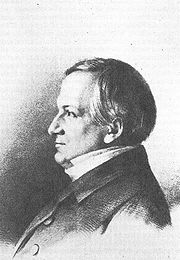
Ernst Ludwig von Gerlach
Encyclopedia

Conservatism
Conservatism is a political and social philosophy that promotes the maintenance of traditional institutions and supports, at the most, minimal and gradual change in society. Some conservatives seek to preserve things as they are, emphasizing stability and continuity, while others oppose modernism...
Prussian
Kingdom of Prussia
The Kingdom of Prussia was a German kingdom from 1701 to 1918. Until the defeat of Germany in World War I, it comprised almost two-thirds of the area of the German Empire...
judge
Judge
A judge is a person who presides over court proceedings, either alone or as part of a panel of judges. The powers, functions, method of appointment, discipline, and training of judges vary widely across different jurisdictions. The judge is supposed to conduct the trial impartially and in an open...
, politician
Politics
Politics is a process by which groups of people make collective decisions. The term is generally applied to the art or science of running governmental or state affairs, including behavior within civil governments, but also applies to institutions, fields, and special interest groups such as the...
, and editor
Literary editor
A literary editor is an editor in a newspaper, magazine or similar publication who deals with aspects concerning literature and books, especially reviews. A literary editor may also help with editing books themselves, by providing services such as proof reading, copy-editing, and literary...
. He was the son of Carl Friedrich Leopold von Gerlach and the brother of Ludwig Friedrich Leopold von Gerlach
Ludwig Friedrich Leopold von Gerlach
Leopold von Gerlach was a Prussian army general, adjutant to Frederick William IV of Prussia and a Protestant conservative associate of Otto von Bismarck.-Biography:...
.
Gerlach was born in Berlin
Berlin
Berlin is the capital city of Germany and is one of the 16 states of Germany. With a population of 3.45 million people, Berlin is Germany's largest city. It is the second most populous city proper and the seventh most populous urban area in the European Union...
, Brandenburg
Margraviate of Brandenburg
The Margraviate of Brandenburg was a major principality of the Holy Roman Empire from 1157 to 1806. Also known as the March of Brandenburg , it played a pivotal role in the history of Germany and Central Europe....
. From 1813–15, he fought in the War of the Sixth Coalition
War of the Sixth Coalition
In the War of the Sixth Coalition , a coalition of Austria, Prussia, Russia, the United Kingdom, Portugal, Sweden, Spain and a number of German States finally defeated France and drove Napoleon Bonaparte into exile on Elba. After Napoleon's disastrous invasion of Russia, the continental powers...
, and later pursued a judicial career. Gerlach became Judge of the High Court, or Oberlandesgerichtsrat, in the city of Naumburg
Naumburg
Naumburg is a town in Germany, on the Saale River. It is in the district Burgenlandkreis in the Bundesland of Saxony-Anhalt. It is approximately southwest of Leipzig, south-southwest of Halle, and north-northeast of Jena....
in 1823. In 1829, he became Agricultural and Municipal Court Director in Halle
Halle, Saxony-Anhalt
Halle is the largest city in the German state of Saxony-Anhalt. It is also called Halle an der Saale in order to distinguish it from the town of Halle in North Rhine-Westphalia...
. By 1835, Gerlach was the Vice President of the Higher Regional Court in Frankfurt (Oder)
Frankfurt (Oder)
Frankfurt is a town in Brandenburg, Germany, located on the Oder River, on the German-Polish border directly opposite the town of Słubice which was a part of Frankfurt until 1945. At the end of the 1980s it reached a population peak with more than 87,000 inhabitants...
.
During the revolutions of 1848
Revolutions of 1848 in the German states
The Revolutions of 1848 in the German states, also called the March Revolution – part of the Revolutions of 1848 that broke out in many countries of Europe – were a series of loosely coordinated protests and rebellions in the states of the German Confederation, including the Austrian Empire...
, Gerlach was involved in the founding of the Kreuzzeitung
Kreuzzeitung
The Neue Preußische Zeitung was a German newspaper printed in Berlin from 1848–1939. It was known as the Kreuzzeitung or Kreuz-Zeitung because its emblem was an Iron Cross .The newspaper was founded during the revolutions of 1848 by Herrmann Wagener to act as the voice for Prussian conservatives,...
, a conservative newspaper. The paper became the main artery for the Prussian Conservative Party's ideas, and it opposed Otto von Bismarck
Otto von Bismarck
Otto Eduard Leopold, Prince of Bismarck, Duke of Lauenburg , simply known as Otto von Bismarck, was a Prussian-German statesman whose actions unified Germany, made it a major player in world affairs, and created a balance of power that kept Europe at peace after 1871.As Minister President of...
's plans for German unification during the 1860s and 1870s.

